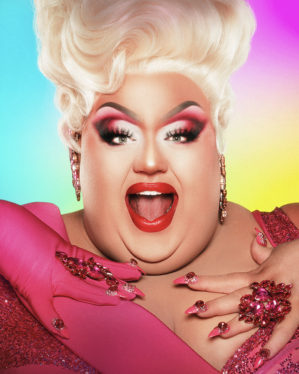Drag superstar Eureka O’Hara is curious about what else right-wing lawmakers are afraid of these days. “We know about the homophobia and the transphobia, but are any of them afraid of heights? Or spiders?” she quips to Billboard over the phone. “Do we destroy all spiders and not allow anyone to ever go above 10 feet because someone’s afraid of it?”
The RuPaul’s Drag Race alumna and latest Billboard cover star (alongside Maren Morris, Sasha Colby, Landon Cider and Symone) is emphasizing a larger point about the epidemic of anti-LGBTQ legislation proliferating around the U.S. — it’s all about fear. “They want the world to be the way that they’ve known it to be, because we as a society have been — and I’m going to use one of their terms — groomed to live a very patterned life. It’s the only way that they are comfortable,” they explain. “But the world isn’t just about one mindset of comfort. Everyone deserves to be comfortable in this world. That’s what drag is pushing: self-comfort, self-love.”
O’Hara speaks from experience — she’s been performing in drag for nearly two decades. Her love of the art form began at age 16, when a friend snuck her into a gay bar called New Directions, the closest one to her small hometown of Bristol, Tenn. Taking a seat, O’Hara recalls seeing “this big woman with huge boobs and a giant high ponytail” walk out onto the stage and begin performing a Britney Spears song. “As soon as she hit the spotlight, she was just big and large and in charge and gorgeous,” she recalls. “My jaw was on the freaking floor. I thought, ‘This is what I’ve been waiting to see.’ ”
The on-stage amazon was Jacqueline St. James, who would later agree to become O’Hara’s drag mother. Immersing herself in the Southern drag culture, O’Hara recalls their early days in drag — paying a queen to paint her face for $25, buying a $10 synthetic wig to throw on, and even finding a creative solution for needing heels in a size 16. “I found a pair of slingbacks that did not meet the end of my heel — so I bought some blue duct tape that matched my dress, and I wrapped duct tape from the toe of that shoe all the way up to my kneecaps,” they recall, cackling. “I swore I was wearing a sexy thigh-high boot.”
While she was exploring the DIY, glitter-caked world of Southern drag, O’Hara was also exploring her own gender. At the age of 18, she came out as a transgender woman and began to live her life openly — but after six years, she de-transitioned, deciding to go back to living as the gender she was assigned at birth.
The concept of de-transitioning is a topic that’s fueled much of the right-wing, anti-trans agenda of late; if a young person like O’Hara can regret transitioning, then why shouldn’t they be prevented from making such a decision?
But the drag star explains their process of de-transitioning was not born out of regret — it was a retreat from the painful reality that anti-trans legislation helps foster. “I was very abused, and I went through a lot of trauma,” she says, matter-of-factly. “I was afraid I wouldn’t survive it mentally, physically or financially.”
About six years after de-transitioning, O’Hara found herself in a much better place; she’d established a name for herself on three different seasons of RuPaul’s Drag Race and was co-starring in HBO’s acclaimed reality series We’re Here with Bob the Drag Queen and Shangela, meeting people from across America and turning them into drag queens for one-night-only performances.
After watching the show’s crew deftly and sensitively handle the stories of three trans people in Grand Junction, Colo., O’Hara finally felt empowered again. “I realized I had to come out,” she says. “I knew that was the safest place I could do it, because they were going to give me an opportunity to tell my story in a place where I felt safe.”
Getting to live her life again as an openly transgender woman has liberated O’Hara — she says that friends and family regularly comment on how much happier she seems on a day-to-day basis. She’s kept herself plenty busy — between performing as part of the rotating cast of RuPaul’s Drag Race Live! in Las Vegas and taking home a GLAAD Award in May for We’re Here, O’Hara is happily living the best version of her life.
Had it not been for queens like Jacqueline St. James or the life-affirming art of drag itself, she says she wouldn’t get to experience that joy today. “What sets drag apart from other art forms is that through this art, you find community and family and purpose. We, as drag queens, take in those stray queer kids that are abandoned by their families, and we create our own families,” she says. “Drag is more than just a performance. It’s also a representation of finding your own path when there’s no path given.”
As for the lawmakers trying to erase trans people and drag artists from existence? “People can try to tell us that we can’t do our jobs, and we can’t live in the ‘real world,’ ” she says. “But we do live in the real world. And we’re not going anywhere.”
A version of this story will appear in the June 10, 2023, issue of Billboard.
https://www.billboard.com/culture/pride/eureka-ohara-drag-laws-interview-1235346131/




